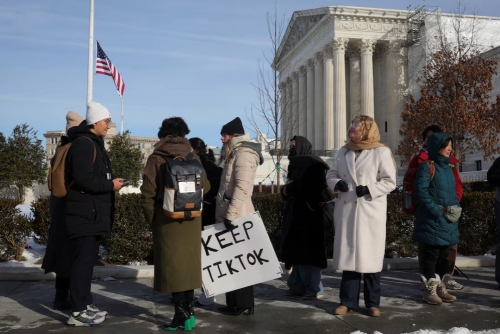How TikTok’s US Ban Could Impact Middle Eastern Content Creators
TDT | Manama
Email : ashentharaka@newsofbahrain.com
As the United States prepares for a potential TikTok ban, content creators in the Middle East are watching closely. While the ban will primarily affect US-based influencers, the ripple effects are expected to be felt globally, especially in regions where TikTok has become a vital platform for personal branding, business promotion, and social engagement.
TikTok has revolutionized digital content creation, offering users in the Middle East the opportunity to reach large audiences, promote local businesses, and engage in social activism. However, the looming ban raises concerns about the future of creators who rely on the platform to generate income and visibility. For many Middle Eastern influencers, the ban could create challenges that force them to rethink their strategies and diversify their online presence.
While the Middle East will not be directly impacted by the ban, the uncertainty surrounding TikTok’s future raises questions about the sustainability of a creator’s career on a single platform. Dubai-based content creator and digital strategist Naomi D’Souza warns, “The TikTok scenario is a powerful reminder that creators and brands need to diversify their platforms.” By adopting a multi-platform approach, creators can mitigate risks associated with the volatility of platform policies and changes in algorithms.
The potential US ban also underscores the importance of adapting to the fast-evolving digital landscape. “To survive, creators must continuously find new ways to engage their audience and stay ahead of trends,” says Konstantin Koloskov, Dubai-based entrepreneur and co-host of the Culture Mapping podcast. “Platform bans can happen unexpectedly, so preventive actions—like diversifying content across multiple channels—should be a priority.”
For Middle Eastern influencers, TikTok has been a key tool for gaining visibility across borders, expanding their reach, and building international followings. The app’s algorithm allows creators to reach far-flung audiences, from young entrepreneurs in Dubai to aspiring artists in Cairo. A ban in the US, which is home to many global brands and advertisers, could force creators to adjust their strategies, potentially leading to increased marketing costs or a drop in visibility.
Despite these challenges, content creators like Nidhi Kumar, a Dubai-based choreographer with over 1 million TikTok followers, stress the importance of diversifying content. Kumar, who has expanded her audience across six platforms over seven years, advises creators to tailor their content to each platform’s unique audience. “Every platform has an expiry date,” Kumar says. “Each piece of content should be designed specifically for the platform and its users.”
As TikTok’s legal battle unfolds, Middle Eastern creators are preparing for the possibility of a platform shift. While the US may be at the epicenter of the ban, the consequences are global, and influencers across the Middle East must be proactive in ensuring their online presence remains strong, adaptable, and future-proof. With the digital landscape constantly changing, the key to long-term success will be diversification and strategic content planning.
Related Posts

